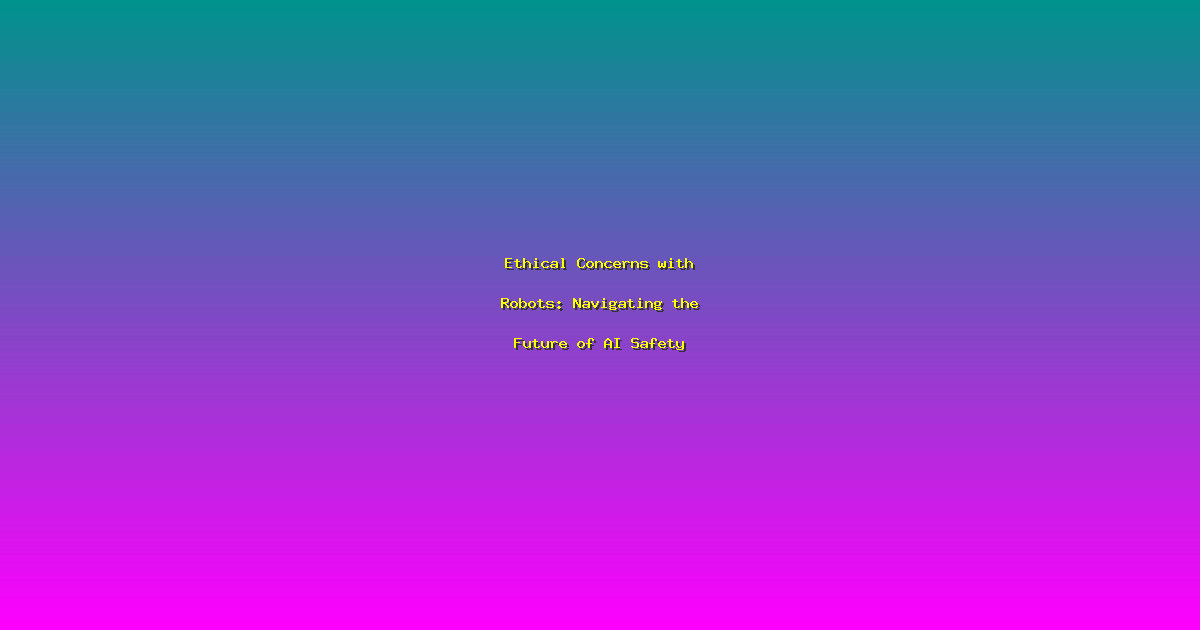Ethical Concerns with Robots: Navigating the Future of AI Safety
The rapid advancement of robotics and artificial intelligence (AI) has transformed numerous industries, including healthcare, manufacturing, and transportation. As robots and AI systems become more integrated into our daily lives, it's crucial to address the ethical concerns that arise. This article dives into the complexities of ensuring that these technological advancements are not only effective but also ethically sound, emphasizing the importance of ethical considerations as we move forward.
The Intersection of Ethics and Technology
Ethics and technology are converging in ways that challenge our traditional understanding of moral responsibility. As robots and AI systems become more autonomous, the decisions they make and the actions they take come under ethical scrutiny. Questions regarding accountability, privacy, and the impact on employment are just the tip of the iceberg. It's imperative that we develop a comprehensive ethical framework to guide the development and deployment of these systems.
Privacy and Surveillance
One of the primary ethical concerns with robots and AI is their ability to infringe on privacy. As these technologies gather data, the potential for misuse becomes a significant issue. Surveillance robots and AI systems that monitor public spaces raise questions about the balance between security and personal privacy. It's essential to establish clear guidelines and regulations to protect individual privacy rights while still allowing for the benefits of technology.
Impact on Employment
Robots and AI systems are increasingly being used in tasks that were once performed by humans, leading to concerns about unemployment and the widening economic disparity. While these technologies can increase efficiency and productivity, they also have the potential to displace jobs. As we move towards greater automation, there must be a focus on retraining and reskilling the workforce to adapt to these changes and mitigate the negative economic impacts.
Accountability and Responsibility
The issue of accountability is particularly challenging in the realm of AI and robotics. When a robot or AI system makes a mistake or causes harm, determining who is responsible can be complex. There is a growing need for legal frameworks that can address these situations and hold the appropriate parties accountable. This includes manufacturers, developers, and users of these technologies.
Regulation and Oversight
Effective regulation is crucial to ensuring that robots and AI are used ethically. Governments and international organizations must work together to create policies that protect public interest while fostering innovation. This involves creating standards for AI development, ensuring transparency in AI decision-making processes, and establishing oversight mechanisms to monitor the ethical implications of these technologies.
FAQs
What is the primary ethical concern with AI?
One primary concern is the potential for AI to infringe on privacy and make decisions that could harm individuals without clear accountability.
How can we ensure AI systems are ethical?
Ensuring that AI systems are ethical involves developing clear ethical guidelines, ensuring transparency in AI operations, and implementing robust oversight mechanisms.
What are the employment implications of AI?
AI and automation can lead to job displacement, particularly in industries with routine tasks, and highlight the need for retraining programs to help workers adapt.
How can AI be used responsibly?
Responsible AI use involves adhering to ethical guidelines, ensuring transparency, and continuously monitoring and adjusting AI systems to prevent unintended negative consequences.
What role do governments play in AI regulation?
Government bodies play a critical role in creating necessary regulations and standards to ensure the ethical deployment of AI technologies.
What are the future challenges of AI ethics?
Future challenges include dealing with the rapid evolution of AI technology, ensuring global ethical standards, and addressing the ethical implications of AI in military and security contexts.
Conclusion and Call to Action
The future of robots and AI holds immense promise, but it also presents significant ethical challenges. As we continue to integrate these technologies into our daily lives, it is imperative that we prioritize ethical considerations. By fostering a dialogue around the ethical implications of AI and robotics, we can ensure that these advancements benefit society as a whole. Join the conversation, stay informed, and advocate for ethical innovation.

